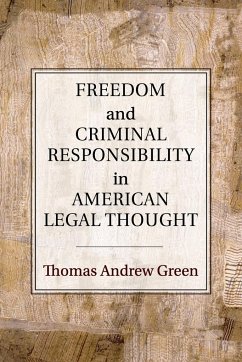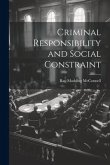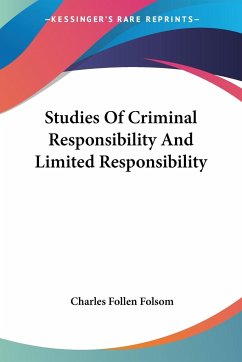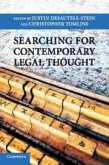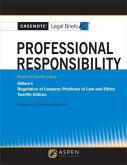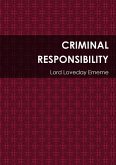Thomas Andrew Green
Freedom and Criminal Responsibility in American Legal Thought
28,99 €
inkl. MwSt.
Versandfertig in 1-2 Wochen

14 °P sammeln
Thomas Andrew Green
Freedom and Criminal Responsibility in American Legal Thought
- Broschiertes Buch
- Merkliste
- Auf die Merkliste
- Bewerten Bewerten
- Teilen
- Produkt teilen
- Produkterinnerung
- Produkterinnerung
This book deals with the most fundamental problem in criminal law, the way in which free will and determinism relate to criminal responsibility.
Andere Kunden interessierten sich auch für
![Criminal Responsibility and Social Constraint Criminal Responsibility and Social Constraint]() Ray Madding McconnellCriminal Responsibility and Social Constraint26,99 €
Ray Madding McconnellCriminal Responsibility and Social Constraint26,99 €![Studies Of Criminal Responsibility And Limited Responsibility Studies Of Criminal Responsibility And Limited Responsibility]() Charles Follen FolsomStudies Of Criminal Responsibility And Limited Responsibility17,99 €
Charles Follen FolsomStudies Of Criminal Responsibility And Limited Responsibility17,99 €![Searching for Contemporary Legal Thought Searching for Contemporary Legal Thought]() Searching for Contemporary Legal Thought60,99 €
Searching for Contemporary Legal Thought60,99 €![Corporate Environmental Responsibility in Investor-State Dispute Settlement Corporate Environmental Responsibility in Investor-State Dispute Settlement]() Tomoko IshikawaCorporate Environmental Responsibility in Investor-State Dispute Settlement43,99 €
Tomoko IshikawaCorporate Environmental Responsibility in Investor-State Dispute Settlement43,99 €![An Institutional Approach to the Responsibility to Protect An Institutional Approach to the Responsibility to Protect]() An Institutional Approach to the Responsibility to Protect54,99 €
An Institutional Approach to the Responsibility to Protect54,99 €![Casenote Legal Briefs for Professional Responsibility Keyed to Gillers Casenote Legal Briefs for Professional Responsibility Keyed to Gillers]() Casenote Legal BriefsCasenote Legal Briefs for Professional Responsibility Keyed to Gillers71,99 €
Casenote Legal BriefsCasenote Legal Briefs for Professional Responsibility Keyed to Gillers71,99 €![CRIMINAL RESPONSIBILITY CRIMINAL RESPONSIBILITY]() Lord Loveday EmemeCRIMINAL RESPONSIBILITY10,99 €
Lord Loveday EmemeCRIMINAL RESPONSIBILITY10,99 €-
-
-
This book deals with the most fundamental problem in criminal law, the way in which free will and determinism relate to criminal responsibility.
Hinweis: Dieser Artikel kann nur an eine deutsche Lieferadresse ausgeliefert werden.
Hinweis: Dieser Artikel kann nur an eine deutsche Lieferadresse ausgeliefert werden.
Produktdetails
- Produktdetails
- Verlag: Cambridge University Press
- Seitenzahl: 520
- Erscheinungstermin: 27. April 2015
- Englisch
- Abmessung: 234mm x 156mm x 30mm
- Gewicht: 876g
- ISBN-13: 9781107566880
- ISBN-10: 1107566886
- Artikelnr.: 43043879
- Herstellerkennzeichnung
- Libri GmbH
- Europaallee 1
- 36244 Bad Hersfeld
- gpsr@libri.de
- Verlag: Cambridge University Press
- Seitenzahl: 520
- Erscheinungstermin: 27. April 2015
- Englisch
- Abmessung: 234mm x 156mm x 30mm
- Gewicht: 876g
- ISBN-13: 9781107566880
- ISBN-10: 1107566886
- Artikelnr.: 43043879
- Herstellerkennzeichnung
- Libri GmbH
- Europaallee 1
- 36244 Bad Hersfeld
- gpsr@libri.de
Thomas Andrew Green is the John P. Dawson Collegiate Professor of Law emeritus and Professor of History emeritus at the University of Michigan. He served as editor or coeditor of Studies in Legal History, the book series of the American Society for Legal History, from 1986 to 2011. Green has also served as president of the American Society for Legal History, has been a Fellow of the Center for Advanced Studies in the Behavioral Sciences, and has held fellowships from the National Endowment for the Humanities and the John Simon Guggenheim Memorial Foundation. One of his previous publications, Verdict According to Conscience: Perspectives on the English Criminal Trial Jury, 1200-1800 (1985), and the present volume together form the framework of his current project, a study of the relationship between ideas about the jury and ideas about criminal responsibility in the English and American past. That project will complete Green's work on two aspects of freedom in Anglo-American criminal justice history: political liberty and free will.
Introduction; Part I. Freedom and Criminal Responsibility in the Age of
Pound: 1. The fin de siècle: Speranza; 2. The Progressive Era: Pound; 3.
Pound eclipsed?: the conversation of the mid to late 1920s; Part II.
Conventional Morality and the Rule of Law: Freedom and Criminal
Responsibility in the Forgotten Years, 1930-60: 4. Scientific positivism,
utilitarianism, and the wages of conventional morality, 1930-7; 5.
Entr'acte: intimations of freedom, 1937-53; 6. Durham v. US, the moral
context of the law, and reinterpretations of the Progressive inheritance,
1954-8; Part III. Freedom, Criminal Responsibility, and Retributivism in
Late Twentieth-Century Legal Thought: 7. The foundations of
neo-retributivism, 1957-76; 8. Rethinking the freedom question, 1978-94; 9.
Competing perspectives at the close of the twentieth century; Conclusion.
Pound: 1. The fin de siècle: Speranza; 2. The Progressive Era: Pound; 3.
Pound eclipsed?: the conversation of the mid to late 1920s; Part II.
Conventional Morality and the Rule of Law: Freedom and Criminal
Responsibility in the Forgotten Years, 1930-60: 4. Scientific positivism,
utilitarianism, and the wages of conventional morality, 1930-7; 5.
Entr'acte: intimations of freedom, 1937-53; 6. Durham v. US, the moral
context of the law, and reinterpretations of the Progressive inheritance,
1954-8; Part III. Freedom, Criminal Responsibility, and Retributivism in
Late Twentieth-Century Legal Thought: 7. The foundations of
neo-retributivism, 1957-76; 8. Rethinking the freedom question, 1978-94; 9.
Competing perspectives at the close of the twentieth century; Conclusion.
Introduction; Part I. Freedom and Criminal Responsibility in the Age of
Pound: 1. The fin de siècle: Speranza; 2. The Progressive Era: Pound; 3.
Pound eclipsed?: the conversation of the mid to late 1920s; Part II.
Conventional Morality and the Rule of Law: Freedom and Criminal
Responsibility in the Forgotten Years, 1930-60: 4. Scientific positivism,
utilitarianism, and the wages of conventional morality, 1930-7; 5.
Entr'acte: intimations of freedom, 1937-53; 6. Durham v. US, the moral
context of the law, and reinterpretations of the Progressive inheritance,
1954-8; Part III. Freedom, Criminal Responsibility, and Retributivism in
Late Twentieth-Century Legal Thought: 7. The foundations of
neo-retributivism, 1957-76; 8. Rethinking the freedom question, 1978-94; 9.
Competing perspectives at the close of the twentieth century; Conclusion.
Pound: 1. The fin de siècle: Speranza; 2. The Progressive Era: Pound; 3.
Pound eclipsed?: the conversation of the mid to late 1920s; Part II.
Conventional Morality and the Rule of Law: Freedom and Criminal
Responsibility in the Forgotten Years, 1930-60: 4. Scientific positivism,
utilitarianism, and the wages of conventional morality, 1930-7; 5.
Entr'acte: intimations of freedom, 1937-53; 6. Durham v. US, the moral
context of the law, and reinterpretations of the Progressive inheritance,
1954-8; Part III. Freedom, Criminal Responsibility, and Retributivism in
Late Twentieth-Century Legal Thought: 7. The foundations of
neo-retributivism, 1957-76; 8. Rethinking the freedom question, 1978-94; 9.
Competing perspectives at the close of the twentieth century; Conclusion.
